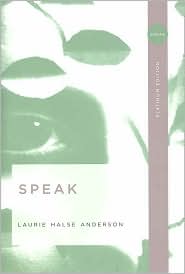Speak- Laurie Halse Anderson
When Melinda calls the cops at an end of summer party, she finds herself the pariah of her high school. Her friends won’t talk to her and people she's never met hate her. Melinda is alone, trying not to think about what happened to her that night. If she thought about it, she would have to SPEAK the truth and then her life could really unravel.
I have to say upfront that I read this book in one sitting and loved it. Now the hard part, what makes it so good? I think it’s the simple language that Anderson uses. The metaphors she uses to describe what happens are not cliché, they are hers alone—new and unique. The voice is in first person and the reader learns in heart-breaking detail what the school year is like for her. No friends to speak of, no one to talk to, she is alone in her own head and for a girl like Melinda, that’s the last place she wants to be.
The novel is broken down into the four marking periods that comprise the school year. The sections are further broken down into vignettes that occur during that time. Things like gym class, job day, pep rally are used to move the novel forward.
Melinda finds an abandoned janitor’s closet that becomes her refuge when the day becomes too much for her to handle. She also finds solace in her art class, trying all year to draw the perfect tree. These two things provide her with the strength she needs to endure.
It’s clear that Melinda is depressed, but Anderson never states the words outright. She portrays Melinda with the symptoms of depression. She shows a lack of interest in almost everything; she needs and wants to sleep all the time, she shows a lack or disregard for personal hygiene. Her grades have plummeted from the year before. Even the town she lives in is dreary and gray. For writers trying to master the mantra “show don’t tell,” Speak provides the perfect example of what that means. Anderson shows the reader Melinda’s turmoil, never once does she tell us how she feels, she shows us her inner wrath in every scene. By the end you want her to finally SPEAK the truth.
Next up: Tale of Despereaux
Anon,
Nancy





